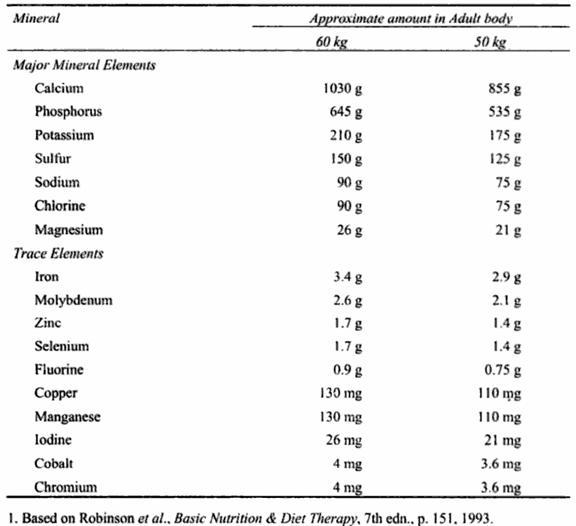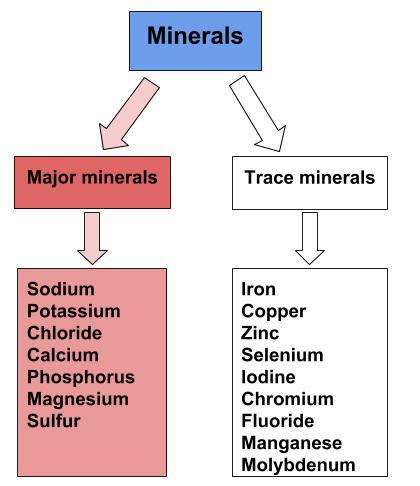Step into the hidden world of cells, where tiny molecules of minerals orchestrate the grand symphony of life. We often marvel at the intricate complexity of the human body, but the true wonders lie within the very building blocks that make it function – the cells. Deep within these microscopic powerhouses, a vital secret hides, waiting to be unraveled: the role of intracellular minerals and their profound impact on our cellular function and overall health.
While these minerals may be invisible to the naked eye, their influence is anything but inconsequential. From the essential trace elements to the macrominerals, their presence within cell membranes, organelles, and enzymatic reactions can either nourish or hinder the delicate harmony of our bodies. Understanding the intricate dance between intracellular minerals and cellular function offers us an unparalleled glimpse into the mechanisms that govern our physical and mental well-being.
In this exploration, we embark on a captivating journey through the labyrinthine pathways of the cellular world. We delve into the pivotal role of intracellular minerals such as calcium, sodium, potassium, zinc, and iron, illuminating the labyrinth of connections they forge within our cells. Discover how these minuscule minerals wield incredible power, shaping the very foundations of health and vitality.
Prepare to unlock the secrets that lie in the heart of your cells, where the interplay between intracellular minerals and cellular function holds the keys to a vibrant existence. Embark on this captivating voyage as we navigate the depths of cellular life, unearthing the enigmatic relationship between these invisible treasures and the symphony of our health.
Intracellular Minerals: The Building Blocks of Cellular Function
When it comes to understanding the intricate workings of our bodies, it’s crucial to delve into the world of intracellular minerals. These tiny, essential substances are the unsung heroes behind the scenes, playing a vital role in cellular function and overall health. From supporting enzymatic activity to maintaining fluid balance, intracellular minerals are the building blocks upon which our cells thrive.
One of the key players in this mineral orchestra is calcium. Not only does it contribute to the structural integrity of bones and teeth, but it also acts as a messenger, regulating vital processes like muscle contraction and nerve function. Magnesium, on the other hand, wears multiple hats, acting as a cofactor for numerous enzymes involved in energy production, DNA replication, and protein synthesis. Without sufficient magnesium, these fundamental cellular processes can become compromised, leading to a cascade of health issues.
Unlocking the Potential of Intracellular Minerals
Understanding the impact of intracellular minerals on human health enables us to harness their potential for maintaining optimal cellular function. Potassium, for example, aids in maintaining fluid balance, nerve transmission, and muscle contraction. By consuming potassium-rich foods like bananas, avocados, and spinach, we can support the delicate equilibrium required for our cells to function harmoniously. Similarly, zinc plays a crucial role in promoting the immune system’s response, wound healing, and DNA synthesis. Incorporating foods such as oysters, poultry, and legumes into our diets ensures adequate zinc intake.
| Mineral | Function | Food Sources |
|---|---|---|
| Calcium | Structural integrity of bones and teeth; regulates muscle contraction and nerve function | Milk, cheese, yogurt, tofu |
| Magnesium | Cofactor for enzymes involved in energy production, DNA replication, and protein synthesis | Dark chocolate, almonds, spinach |
| Potassium | Maintains fluid balance, aids in nerve transmission and muscle contraction | Bananas, avocados, spinach |
| Zinc | Promotes immune system response, wound healing, and DNA synthesis | Oysters, poultry, legumes |
In conclusion, intracellular minerals serve as the building blocks of cellular function and overall health. By understanding their roles and ensuring adequate intake through a varied and balanced diet, we can optimize the delicate dance of our cellular symphony, paving the way for vibrant well-being.

Unveiling the Crucial Role of Intracellular Minerals in Optimal Health
Intracellular minerals play a crucial role in ensuring optimal health by directly influencing cellular function. These essential minerals, including magnesium, calcium, potassium, and zinc, are necessary components for various biochemical processes within our cells. Their presence and proper balance are vital for facilitating enzyme activity, maintaining cell membrane integrity, and supporting overall cellular communication.
One key aspect of intracellular minerals is their ability to act as co-factors for enzymes, enabling their catalytic functions. For example, magnesium is involved in over 600 enzymatic reactions, contributing to energy production, protein synthesis, and DNA replication. Similarly, calcium is responsible for regulating intracellular signaling pathways, assisting in muscle contractions, and even aiding in neurotransmitter release.
Harnessing the Power of Intracellular Minerals for Enhanced Well-being
Our bodies are complex systems made up of trillions of cells, each playing a crucial role in our overall well-being. Nestled within these tiny powerhouses are intracellular minerals, essential elements that are responsible for regulating vital cellular functions. From maintaining proper hydration levels to supporting enzyme activity, these minerals act as the building blocks for optimal cellular health.
One such mineral is potassium, a key player in maintaining the balance of fluids and electrolytes within our cells. It helps control the electrical impulses that allow our muscles to contract and enables nerve cell communication. Magnesium, on the other hand, is involved in over 300 enzymatic reactions, contributing to energy production, protein synthesis, and DNA replication. Calcium, yet another critical mineral, aids in the transmission of nerve signals, supports strong bone structure, and assists in blood clotting.
Unlocking the Secrets of Intracellular Minerals
Understanding the impact of intracellular minerals on our overall well-being can empower us to take control of our health. By making conscious choices to incorporate mineral-rich foods into our diet, we provide our cells with the necessary tools for optimal function. Leafy greens like spinach and kale are excellent sources of magnesium, whereas dairy products such as milk and yogurt are rich in calcium. Not to be forgotten, bananas are abundant in potassium and can easily be incorporated into a balanced diet.
But it’s not just about what we eat. Our everyday habits also play a significant role in ensuring our cells have access to these vital minerals. Staying hydrated is crucial, as water helps transport minerals and other essential nutrients throughout our bodies. Regular physical activity and exercise further promote cellular health by stimulating blood circulation, delivering oxygen and minerals to our cells.

Key Strategies to Maintain a Healthy Intracellular Mineral Balance
When it comes to maintaining a healthy intracellular mineral balance, there are several key strategies that can greatly impact the overall function and health of our cells. These strategies focus on ensuring that our cells receive an optimal supply of essential minerals, which are vital for numerous cellular processes. By incorporating these strategies into our daily routines, we can support cellular function and promote overall wellness.
1. Eat a nutrient-rich diet: Consuming a diet that is rich in whole, unprocessed foods is crucial for achieving a healthy intracellular mineral balance. Include a variety of fruits, vegetables, whole grains, lean proteins, and healthy fats to ensure you are receiving a wide range of essential minerals. Avoid processed and sugary foods that can disrupt the delicate mineral balance within your cells.
2. Stay hydrated: Proper hydration is key to maintaining a healthy intracellular mineral balance. Water plays a vital role in transporting minerals to our cells and aiding in their absorption. Aim to drink at least 8 glasses of water per day and even more if you engage in physical activity or live in a hot climate. Remember to listen to your body and drink when you feel thirsty.
Wrapping Up
As we delve into the microscopic world of cells, it becomes evident that the power lies within the intricate balance of minerals. These minuscule yet mighty particles intertwine with the very essence of life, the fundamental building blocks that sustain our existence. From the depths of nuclei to the pulsating organelles, the saga of intracellular minerals unravels an awe-inspiring tale of cellular function and health.
Through this journey, we have witnessed the Greek chorus of calcium, orchestrating the symphony of muscle contractions and nerve impulses. We have marveled at the iron’s magnetic prowess, escorting oxygen molecules through the bloodstream, invigorating every breath we take. We have contemplated the mysterious dance of phosphorus, an essential architect, constructing the structural framework of DNA and enabling energy storage within ATP molecules.
But let us not forget the silent hero, magnesium, the unseen force behind countless biochemical reactions, ensuring enzymes perform their vital tasks with precision. And what about the dynamic relationship of sodium and potassium, the yin and yang of cellular equilibrium, maintaining the delicate balance of fluid regulation and electrical signaling?
As we reach the conclusion of this exploration, one resounding truth echoes through the microcosm of cells: the significance of intracellular minerals in maintaining harmony and optimizing health. Each mineral plays a unique role in the grand masterpiece of life, their absence or excess leading to a discordant cacophony that can trigger cellular dysfunction, disease, and ultimately, a breakdown of our well-being.
Our understanding of the intricate interplay between intracellular minerals expands by the day, shining a light on new avenues of scientific discovery. The implications for human health are immense, as we unravel the potential therapeutic applications and the influence of minerals on various physiological processes.
With this newfound knowledge, we stand on the precipice of unlocking the secrets to a healthier future. The understanding of how intracellular minerals affect cellular function and health invites us to appreciate the remarkable delicacy and complexity of our bodies. Let us marvel at the symphony within our cells and strive to maintain the harmonious balance of these microscopic minerals for the benefit of our overall well-being.
So, let us continue to delve deeper, with an insatiable curiosity, embracing the wonders that lie within each cell and accepting the vital role that intracellular minerals play in shaping our existence. Only through this relentless pursuit can we unlock the full potential of our bodies and strive towards a healthier, more vibrant future.


